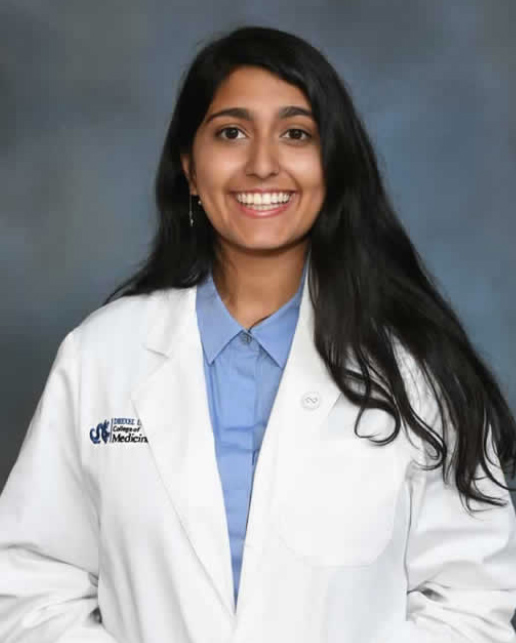
Hometown: Irvine, CA
Undergraduate: University of California, Los Angeles – BS in Neuroscience
What drew you to medicine in general, and to College of Medicine specifically?
My grandfather, who played a significant role in my life, suffered from many neurological issues as he got older. As his neurological decline progressed, my interest in medicine solidified. In addition, medicine is perfect for me in so many aspects. It’s one of the only fields where we are privileged enough to be there for people during their most vulnerable times. Medicine demands compassion, vulnerability, hard work, patience, community service, resilience, sacrifice, investment, grit and more. Medicine also allows you to amplify your patient’s voices and concerns.
I was drawn to Drexel specifically due to its progressive curriculum, diverse faculty and commitment to serving vulnerable populations. Philadelphia is filled with opportunities to serve. I’m here to learn and give it all I’ve got.
What did you study as an undergraduate, and how did those studies prepare you for medical school?
As an undergraduate at UCLA, I studied neuroscience. As I mentioned before, my grandfather played a huge role in my life. His pathology drove me to pursue medicine and specifically, neuroscience. Before that experience, I didn’t care about school or academics at all. Neuroscience at UCLA prepared me incredibly well for medical school. It taught me work ethic and gave me a head start on the incredibly rigorous neuroscience block in HSF2, the third course that first-year medical students must take.
What advice would you give someone who is applying to the College of Medicine straight from undergrad?
I would advise you to ask yourself if you are really ready to apply to medical school. Assuming the student is a traditional student, the student is probably 21 or 22. That is a young age and I advise you to have fun. It is important to study hard and after completing four years of undergraduate work, it is equally important to play hard too.
I think you should reflect on your life experiences, as well. If you feel that you don’t have enough experience to see and meet future patients where they are, then you should spend more time in the real world getting that experience. I believe one of the most important aspects of being a good physician is the ability to empathize and understand where people are in their lives. With this comes uncomfortable conversations, uncharted terrain and constantly pushing yourself to learn more about people that are unlike yourself. It’s one thing to be a nerd. It’s an entirely different thing to be a culturally humble, relatable and compassionate nerd. The latter is better.
What inspired you to create the Community College Outreach Club? How can interested students get involved?
I was chatting with Austin Friedman, who eventually became my co-founder for the club, about our early steps to medicine. Austin went to community college in Florida and I went to community college in California. Despite attending community colleges on the opposite coasts, we realized there were similar themes in our experience: stigma and a lack of representation.
When we were in community college, neither of us met or heard of a medical student that went to community college – it literally seemed impossible. I personally thought at one point, “Can community college students or financially disadvantaged students go to medical school?” Students need to know the answer is, “Yes.” Yes, they can, and they excel at it.
To help end that stigma and lack of representation, Austin and I decided to start a club. We aim to increase community college representation and decrease stigma in the medical profession, provide a network for community college students, and empower students to pursue their interest in the medical profession.
Interested students can send us an email at ducomcco@gmail.com.
What other organizations, extracurriculars, research or community service experiences have you been involved in at the College of Medicine ? How have they impacted your experience here?
I am a proud Student Diversity Ambassador working under the fantastic Dr. Núñez. With her guidance, the Diversity Committee at the College of Medicine plans the “Around the Globe” event where students are invited to learn about different clubs and organizations. The other ambassadors and I also help plan smaller-scale events like the diversity dinner celebrating graduating fourth-year medical students.
I am also a volunteer at the Street Side Clinic via our Health Outreach Project. They have positively impacted my experience because it proves to me that the College of Medicine really does care about the underserved in Philadelphia and diversity within the school.
These experiences allow me to better see people where they are, and to build on that.
What advice would you give to a first-year student?
I would advise them to go easy on themselves. Imposter syndrome is rampant in medical school and it’s natural to feel it sometimes. However, they should keep in mind that the College of Medicine picked them for a reason and they deserve to be here.
I would also give incoming students a heads-up: your priorities are likely to change. You’ll spend way more time studying now than you did as an undergraduate, but you’ll still have time to do the things you love if you manage your time well and prioritize.
You should also try to find one person you can study really well with. It’s in your best interest to have a study bud.